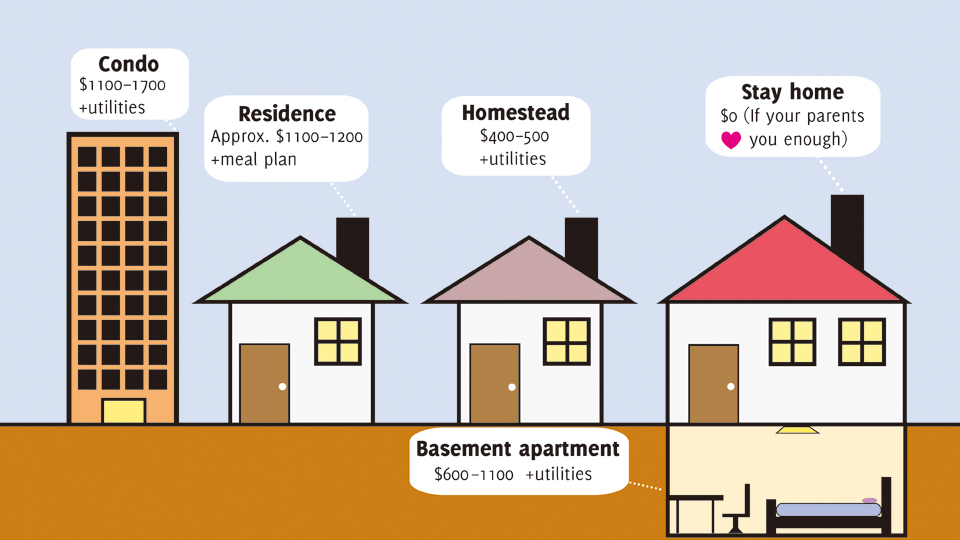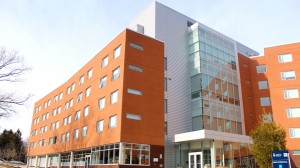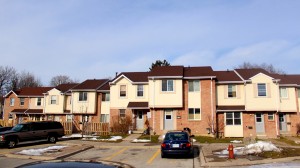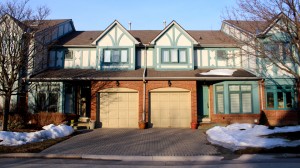MARIA RUIZ
For many people, the start of university symbolizes the beginning of a long-awaited independence—or at least a partial independence. That independence usually comes in the form of a new place to live. Perhaps one of the biggest perks of heading off to university is living alone for the first time. But is it all it’s cracked up to be? The reality of university didn’t always live up to my romanticized fantasies when I was a first-year. Mississauga offers only a few options for student housing. Like anything, each one has its perks and pitfalls. Here’s what to expect.
UTM RESIDENCE
The first housing option that comes to mind when thinking about going away to university is living on residence. Countless Hollywood movies have reinforced the stereotype that if you don’t live on campus for at least one year, you aren’t really getting the full “university experience”. Some residence students say there’s a bit of truth to that statement, partially because it’s the easiest way to meet people in a new community.
UTM Student Housing and Residence Life guarantees first-years a spot on residence as long as they indicate in their initial applications to the university that they’re planning to live on campus. Upper-year students don’t have the same security. Instead, their eligibility is assessed based on a readmission score system. The score is based on factors like their behaviour and cleanliness from the previous year. The higher a student’s score, the more likely she is to get her preferred housing style and roommates.
Upper-year students can look forward to either apartment-style housing (Erindale Hall and Roy Ivor Hall) or townhouse residences (Schreiberwood, Leacock Lane, and MaGrath Valley). The options available to first-year students are Oscar Peterson Hall (two suites connected by a shared bathroom) or other townhouse residences (McLuhan Court, Putnam Place, and Leacock Lane). Of course, different types of residences come at different prices, with the newer, apartment-style housing tending to cost more.
Money aside, what is it actually like to live on campus? The biggest advantage is convenience. Being so close to your classes means not having to worry about things like weather, road conditions, traffic, and so on. You also get to sleep in later. (This may result in heading to class in your pink pajama bottoms or weathered sweats.)
Roommates in their first year are also placed together according to program, making it easier to find people who share the same interest, not to mention a few study buddies.
But residence life has its disadvantages. Moving away from home might be liberating, but it requires a lot more self-discipline—especially when you have friends living less than 10 feet away. Another drawback to this particular kind of housing is that while the university does its best to match you with people with whom you are compatible, roommates are sometimes a problem. Your roommate could be a guy who sleeps in till 4 p.m. and stays up till 8 a.m. Different timetables, different sleep schedules, messiness, and even stolen food are all potential problems when living with someone you didn’t personally choose.
SIR JOHN’S HOMESTEAD
A lesser-known option for students who want a cheaper residence-like experience free of the dons and house checks is Homestead. Sometimes described as the “unofficial residence of UTM”, Sir John’s Homestead is a townhouse community on Dundas Street, just east of UTM. It has a healthy population of students; some Homestead residents even distinguish between “real Homestead”, the part of the neighbourhood made up of families, and “student Homestead”.
Homestead, or “UTM’s unofficial residence”, is drastically cheaper than its official counterpart. For some, the non-academic atmosphere is also an advantage. On the other hand, residents complain about repairs that take forever to complete (some things apparently never get fixed at all). In addition, because so many of Homestead’s residents are students, conflicts with the rest of the community can arise—and have arisen in the past.
OFF-CAMPUS
(CONDO/BASEMENT)
Living off campus seems like the most intimidating option. Your only ruler is your landlord, and depending on how nice he is, you probably won’t see him very often. Independence seems to be the main motivation for students who choose this housing option. Depending on the location and type of the housing, it can be much cheaper or much more expensive than UTM residence. Mississauga’s most common off-campus housing for students comes in the form of condos and basement apartments.
The process of finding off-campus housing is a tedious, time-consuming one. It requires plenty of research, plenty of meetings with landlords and realtors, and plenty of walkthroughs of apartments and rooms.
Some students who chose to live off campus say it’s a decidedly stressful experience, in part because you’re on your own. Depending on the location, the daily commute to campus can be inconvenient and long. Eventually, it can even start to feel like you’re no longer part of the UTM community.
Before you venture out on your own, make sure to research tenant rights and responsibilities, but also keep an eye to your relationship with your landlord. Sometimes, that relationship can be the biggest stressor—especially if your landlord lives right upstairs from your basement apartment.
ANDREEA MIHAI
STAY HOME
When the bus finally comes, you climb on board and begin to thaw out, yawning and trying not to fall asleep on the long ride after another long day of classes. By the time you get home, the cold has migrated to your brain and you can’t imagine how you’ll get yourself started on homework. But then you walk through your front door and you’re family’s there. In most cases, dinner’s ready too. These are some of the advantages of living with family. If your parents are nice enough, you probably won’t have to pay for rent and meals. But living with family can come at the cost of a long commute, since your family probably didn’t select your home with proximity to UTM in mind. Living with family might also come with distractions, like “Be a dear and get me the…” or “Where’s the remote?”, just when you’re trying to get into the study zone.





